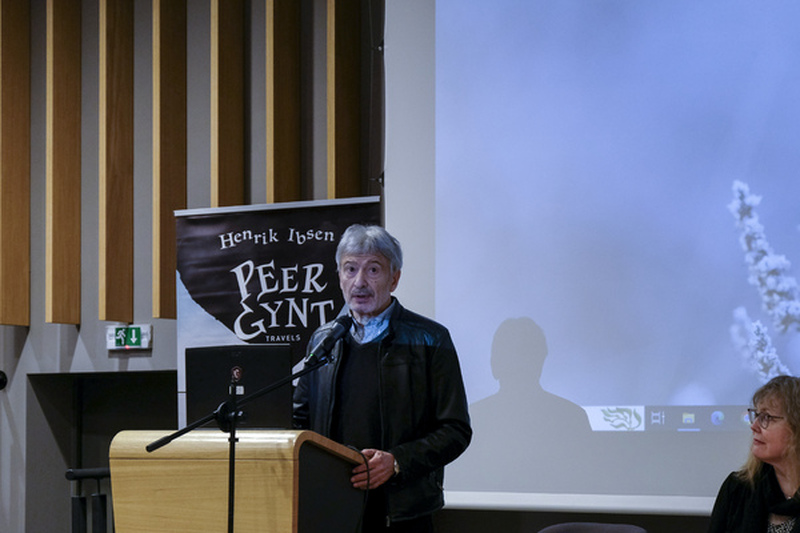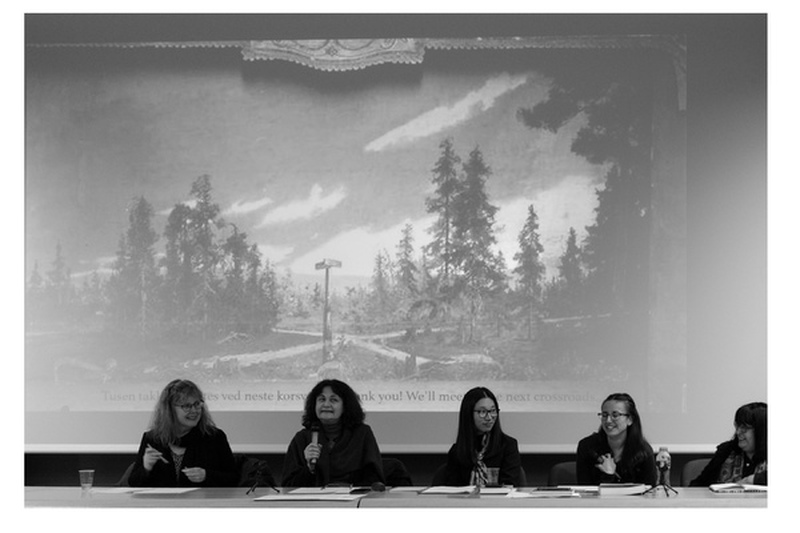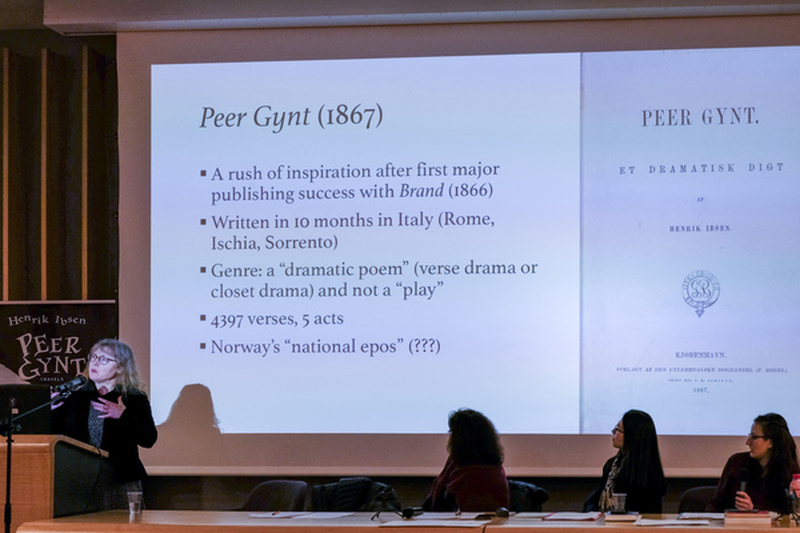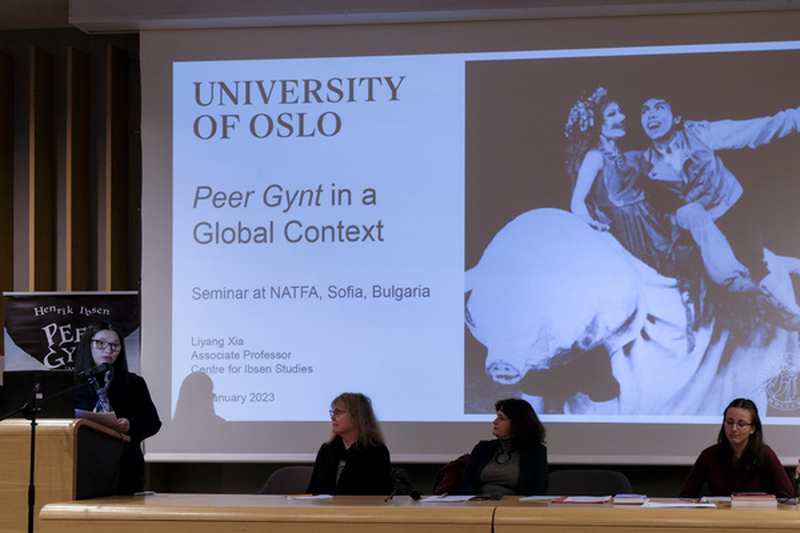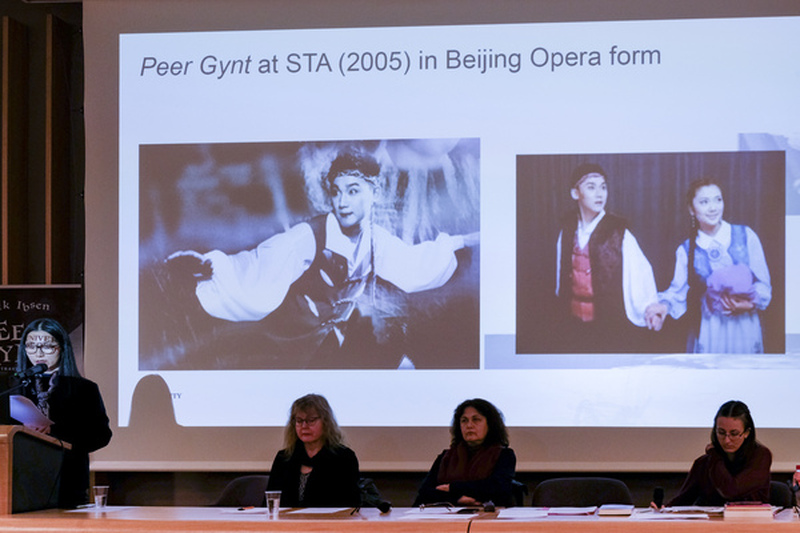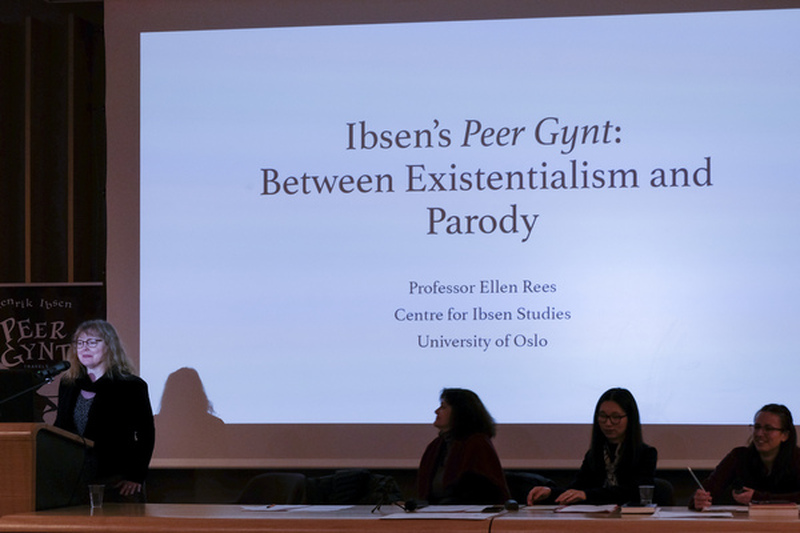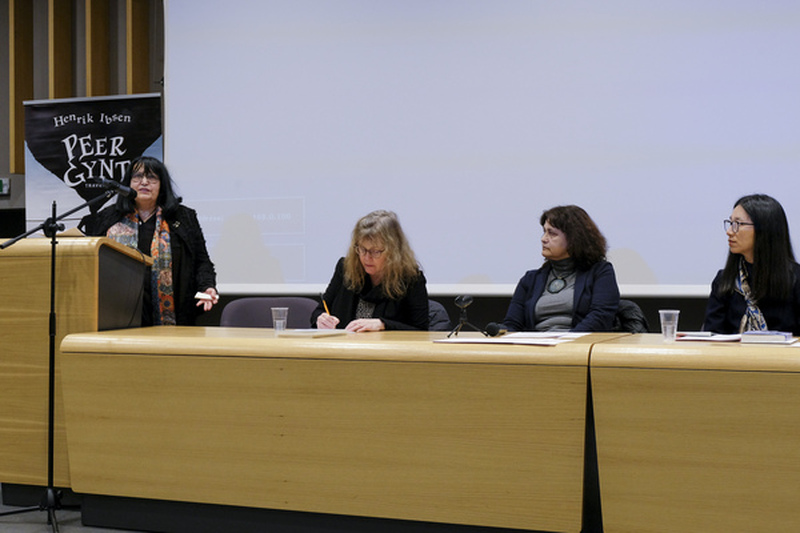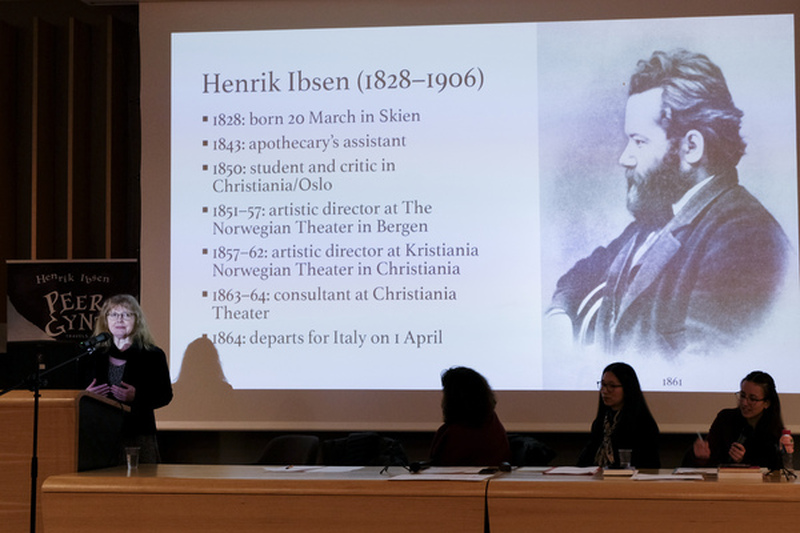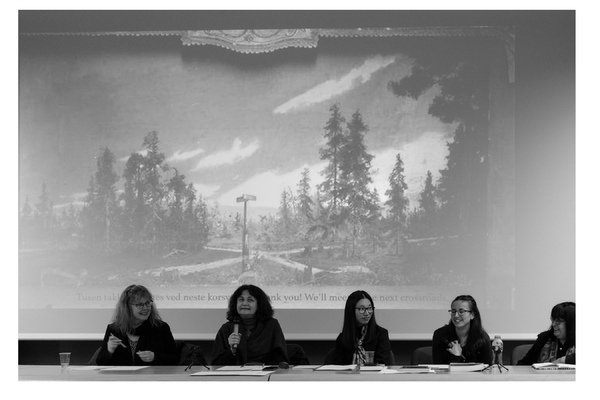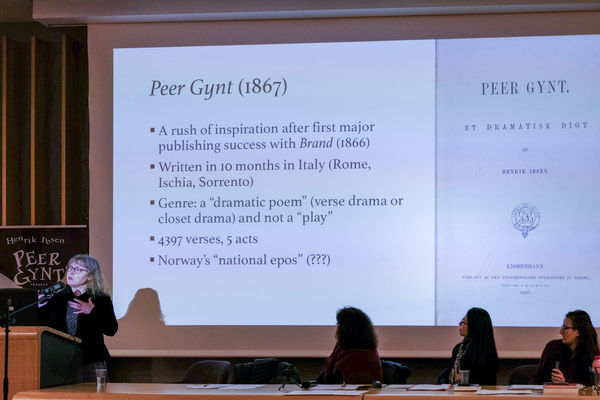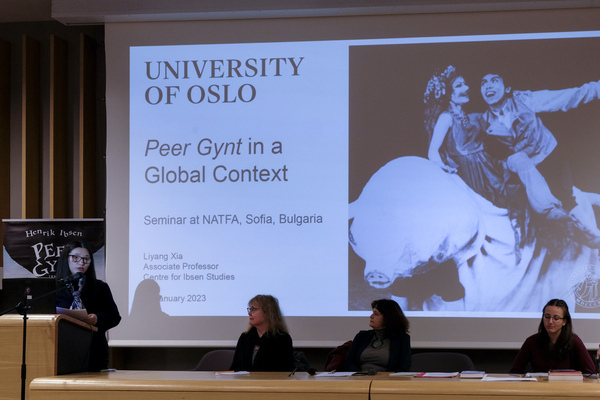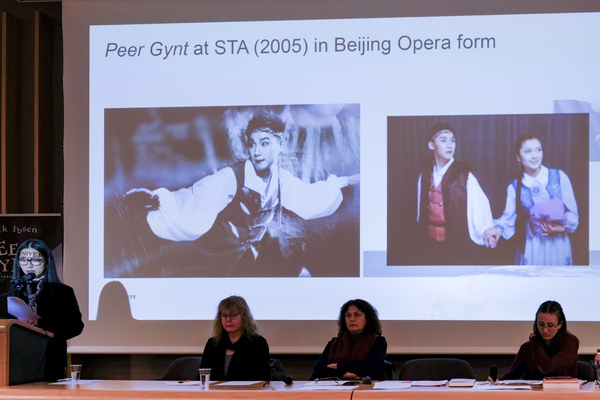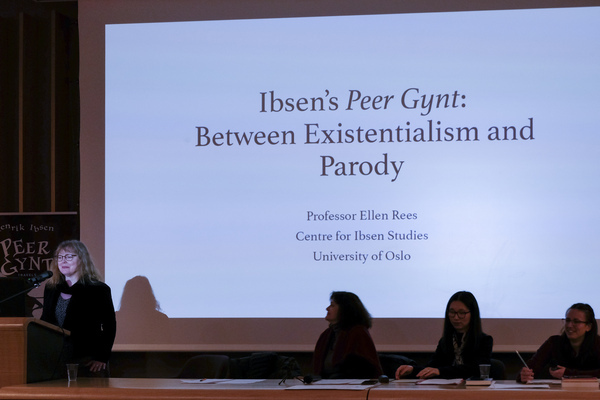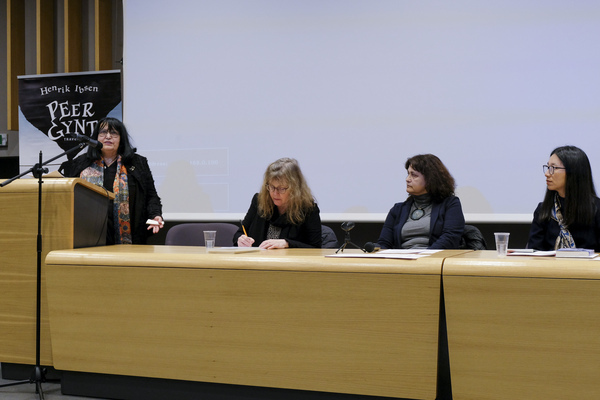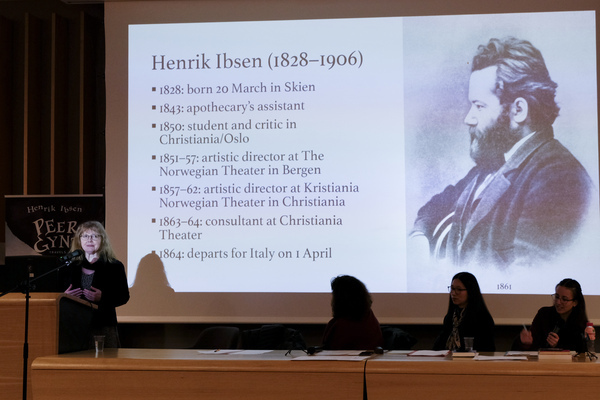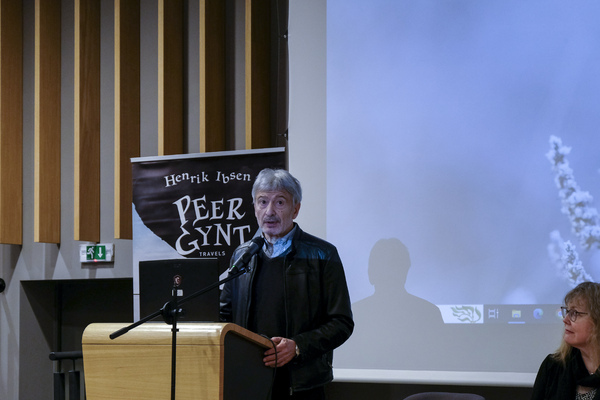
30-01-2023 11:53
"My wish was for the viewer to fall into another dimension and think about the important questions of life and the fight of the soul. The spiritual world of the modern man. Peer is like all young people who travel the world and want to get what it gives.” - Katya Petrova, director of "Pеer Gynt"
In the first months of 2022, "Pеer Gynt" arrived on the Bulgarian stage, recreated by "Theatre Sofia" as part of the "Peer Gynt Travels" project. A year later, instead of taming himself (not that this is in his nature), “Peer Gynt” is on the road in Bulgaria and at theater festivals in Norway. Before this to happen, we - the fans of Henrik Ibsen and his character, gathered in the grand hall of NATFIZ to talk about the life and the creative path of the author and how his cultural heritage has been told around the world over the years. And we also have special guests from Norway:
Prof. Ellen Rees - Professor in Scandinavian Literature at the University of Oslo, heading the University's Centre for Ibsen Studies
Prof. Liyang Xia is a researcher at the Centre, coordinating a two-year master degree program in Ibsen and working on the theme of global awareness of Ibsen
With us are the director of "Theatre Sofia", who played the elder Peer Gynt - Iriney Konstantinov, the director of the play Katia Petrova and a large part of the team. An important part of the event is the premiere of the documentary about the creation of the show. We become part of “Peer Gynt”s path to the stage - from the idea and the desire that have been maturing since the time Iriney was a first year student at NATFIZ. "It made a great impression on me, and it have stayed with me all these years the opinion that this should be on stage at all costs." What's more Norwegian than Peer Gynt!", says Irinei.
We discuss why Ibsen is the second most performed playwright in the world after Shakespeare with between 100 and 180 plays each year. Iriney gives us one of the possible answers - "Everyone finds in Ibsen important things and issues that can relate to the topics of the day. From here derives the interest upon him that never stops.” This is perhaps enough for us, as viewers, but the actors face an even greater challenge - "We read the text, immerse and immerse and finally ask ourselves - how shall we play this? So many ideas, characters, scenes and themes.'', or to put it more philosophically, 'Who am I who plays the one who wonders who he is?'' he continues.
Prof. Ellen Rees comes to rescue, telling us about Ibsen's life and how he became a founder of modern drama. “Peer Gynt” (1867) is Ibsen's second most popular play after “A Doll's House” (1879). Apart from to these, Ibsen wrote more than 300 plays, many of them musical comedies, a popular genre at the time, comparable to today's family comedy sitcoms. Written more for entertainment while Ibsen was in Italy, “Pett Gynt” is nowadays called a Norwegian national epic. The play itself is long – 5 acts and 4 397 verses require the viewer to dedicate himself and really immerse himself in the mixture of biblical and folk motifs seasoned with a generous dose of philosophy. We also have the opportunity to hear a part of the first scene in the Norwegian rhyming sound, and every year a different director puts on stage his own "Peer Gynt" on the Norwegian lake Gala.
Prof. Liang Xia researches "Peer Gynt" and its representation in different countries and cultures. "The theater plays an important role in building the national spirit, the nation. In 1850, a Norwegian-language theater was established in Bergen, for 6 years from 1851 Ibsen was a trainee there. This way he became part of the Norwegian national identity movement.” From here, we jump in time to 1934 and the film adaptation of “Peer Gynt” in Nazi Germany. In line with state doctrine at the time, the trolls were portrayed as Jewish bankers from the London Stock Exchange. In Zimbabwe and Egypt, the production is politicized and shows abuses of African countries with heavy criticism of the West. And one last example - in China "Peer Gynt" was staged for the first time in 1983 in Beijing, with a pig replacing the troll. It relies on local symbolism - the pig is a lesser deity from legend and has negative qualities - individuality and the search for one's own goals, something that is not supported in China. In 2005, it became part of the repertoire of the Beijing Opera and since then it has been staged several more times.
It seems that every nation and era manages to discover its "Peer Gynt", to bring it to life according to its goals and needs. And just like that, for more than 150 years. Here we will end with another quote from Irinei Konstantinov: "Peer Gynt" is one of the oddest and most mysterious plays. The fact that it is not realism allows one to imagine it and opens up many different paths for its application.” Feel welcome to the theater to discover your Peer Gynt.
The project "Peer Gynt Travels" is supported by the Cultural Entrepreneurship, Heritage and Cooperation Program and aims to improve access to culture and art for the public from small cities.
10 facts about Peer Gynt that you may not know
- From 1850 until now, “Peer Gynt” has been staged in 60 countries, having been performed more than 25,000 times
- The work was not written with the idea of being put on stage, but financial reasons made Ibsen change his intention
- In the first years, the play was performed until the 3rd act - the death of the mother, which is considered a worthy poetic finale
- According to Ibsen, people who are not part of Norwegian culture will not be able to understand “Peer Gynt”
- Translation in verse or prose? Many specialists believe that the translation from Norwegian is better to be in prose in order to preserve the meaning of the text.
- Edvard Grieg, who wrote the music for the play, did not like "Peer Gynt". Hans Christian Andersen sincerely regrets having read it at all.
- Similarly to the main character, Ibsen's work has been recreated in many different ways, including a release as a comic in 2014
- Peer Gynt was renamed Peter Windy in the adaptation of the play in Zimbabwe and Egypt
- In Norway, the “Peer Gynt” Award is regularly granted for contributions to the promotion of Norway abroad
- "Peer Gynt" is a logo trademark in Norway and used in the tourism industry
Facts about Henrik Ibsen in Bulgaria
- 5 plays by Ibsen have been put on stage in Bulgaria and performed a total of 105 times
- For the first time "Peer Gynt" was put on stage exactly 100 years ago in 1923 in the Free Theater, under the translation of Geo Milev, and the main role was played by Krastyo Sarafov, and 120 years ago in Ruse, for the first time in Bulgaria an Ibsen play was put on stage
- For the translation into Bulgarian of "Peer Gynt" in verse, Stella Dzhelepova receives an award for outstanding achievements of the Union of Bulgarian Translators
- In addition to "Peer Gynt" at “Theater Sofia”, you can also attend "Peter Gynt" at NATFIZ. The play is a modern adaptation by David Hare.




